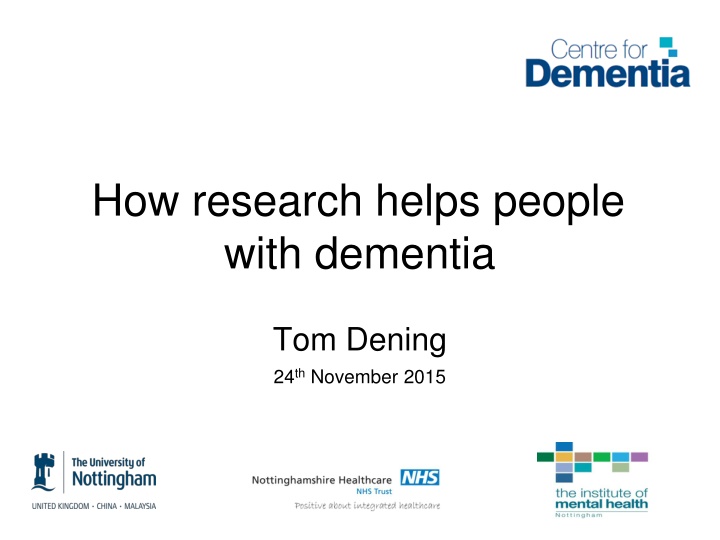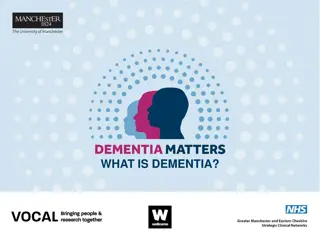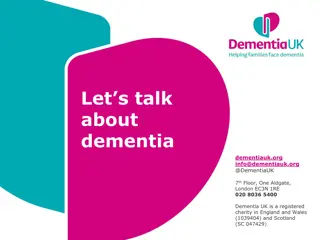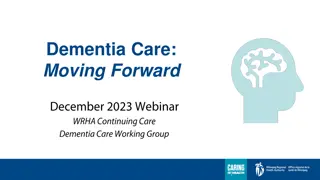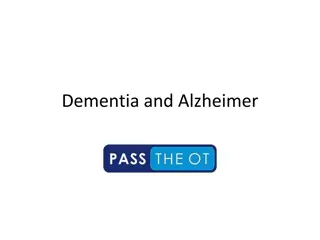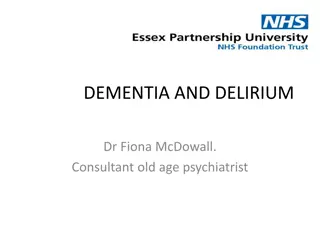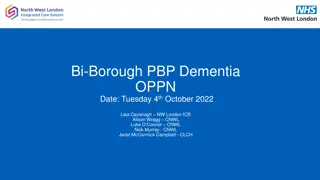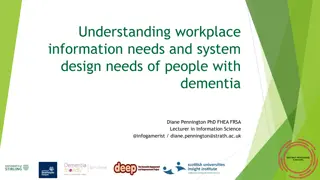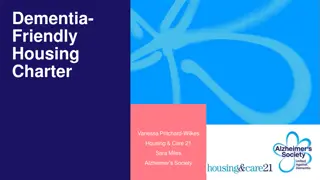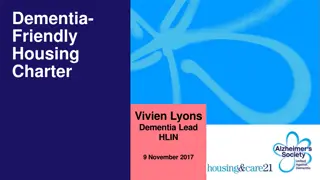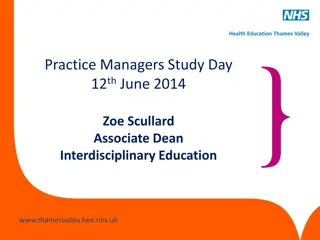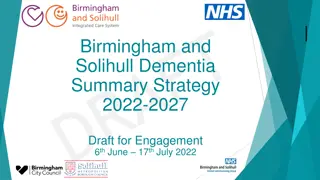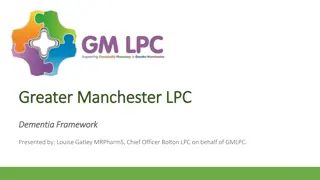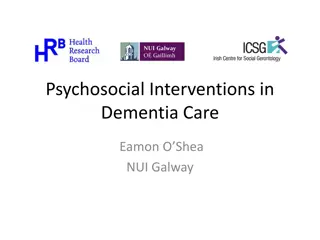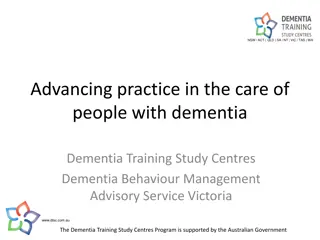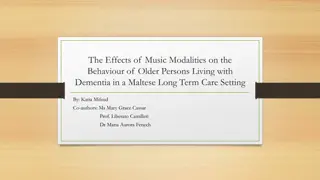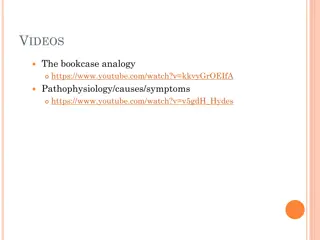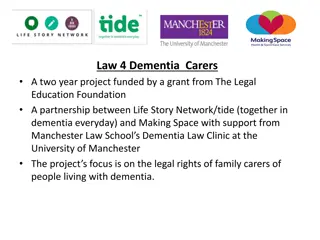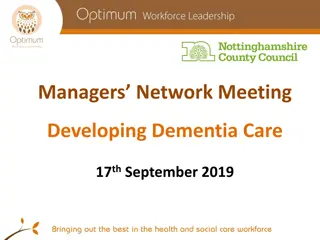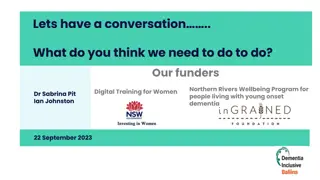The Role of Research in Dementia
Research in dementia explores causes, care, and possible cures to better understand and assist those affected. Genetics, classification, and various research types are vital aspects discussed in the context of dementia studies.
Download Presentation

Please find below an Image/Link to download the presentation.
The content on the website is provided AS IS for your information and personal use only. It may not be sold, licensed, or shared on other websites without obtaining consent from the author.If you encounter any issues during the download, it is possible that the publisher has removed the file from their server.
You are allowed to download the files provided on this website for personal or commercial use, subject to the condition that they are used lawfully. All files are the property of their respective owners.
The content on the website is provided AS IS for your information and personal use only. It may not be sold, licensed, or shared on other websites without obtaining consent from the author.
E N D
Presentation Transcript
How research helps people with dementia Tom Dening 24th November 2015
Overview purposes of research types of research in dementia cause cure care how it helps how you can help 24.11.15 HWB dementia event, Nottingham
Whats research for? we all use research evidence based practice technology in everyday life taking part in research commoner than you think, e.g. just think of all those online surveys! Loyalty cards etc. supporting research displaying literature thinking of research in planning services doing research less common led by academics but we can t do it without help 24.11.15 HWB dementia event, Nottingham
Dementia research Usually divided into: Cause Cure Care Let s think about each type: which gets most money? 24.11.15 HWB dementia event, Nottingham
Cause Includes - basic scientific research - animal models, cellular processes, protein chemistry - molecular genetics - brain imaging - classification & epidemiology 24.11.15 HWB dementia event, Nottingham
24.11.15 HWB dementia event, Nottingham
Genetics What has this told us? undoubtedly, dementia has a significant inherited component small number of rare cases where Alzheimer s disease results from a single gene some other forms of dementia, e.g. frontotemporal dementia, where single genes are important other genes that carry increased but small risks recent studies include massive numbers in order to show these tiny risks current emphasis is on epigenetics, i.e. how genes act 24.11.15 HWB dementia event, Nottingham
How does this help us? we can give more confident advice to people with dementia & families about familial risks if we understand how the genes actually work, this may suggest new types of treatment in practice, clinical genetics advice is not useful and not required 24.11.15 HWB dementia event, Nottingham
Classification scientists love this diagnostic and research criteria for dementia and causes of dementia are frequently refined DSM5 and ICD11 criteria for AD, VaD, DLB, FTD etc neurocognitive disorder v dementia 24.11.15 HWB dementia event, Nottingham
How does this help? clearer diagnostic criteria are helpful in clinical practice: people want to know what s wrong with them research criteria are important as want to have clearly defined groups however, in practice, many people with dementia are elderly and mixed forms of dementia are common 24.11.15 HWB dementia event, Nottingham
Epidemiology = the study of the occurrence, transmission and control of diseases: how common a disease is possible risk factors changes over time what sort of possible interventions may help 24.11.15 HWB dementia event, Nottingham
How does this help? We need to know how many people have dementia now, and how many are expected in the future recent changes in UK numbers based on recent research (approx 750,000) prevalence rate has fallen in recent years, doubtless due to better population health numbers are essential for planning services 24.11.15 HWB dementia event, Nottingham
Cure 24.11.15 HWB dementia event, Nottingham
Approaches to treatment prevention existing drugs cholinesterase inhibitors memantine symptom reduction non-pharmacological treatments future prospects 24.11.15 HWB dementia event, Nottingham
Prevention Action on modifiable risks, including tobacco, poor diet, physical inactivity, and alcohol, and consequent reductions in raised blood pressure, blood cholesterol, obesity, and diabetes could prevent between 3% and 20% of predicted new cases of dementia in 20 years. Lancet 2015; 383: 1805-16 24.11.15 HWB dementia event, Nottingham
Existing drugs cholinesterase inhibitors donepezil, rivastigmine, galantamine available in UK since 1997 modest alerting effects DOMINO-AD trial looked at effects of stopping donepezil and effects on needs for long term care 24.11.15 HWB dementia event, Nottingham
DOMINO-AD trial: Effects of stopping donepezil and/or memantine (Howard et al, 2012) HWB dementia event, Nottingham
DOMINO-AD trial Risk of nursing home placement (Howard et al, 2015) 24.11.15 HWB dementia event, Nottingham
Other medications memantine limited utility, though very safe drugs to treat symptoms antidepressants antipsychotics NB side effects! Banerjee 2009: est. 1800 excess deaths 24.11.15
Future prospects most interest in anti-amyloid drugs in Alzheimer s disease e.g. solanezumab other trials include repurposing of existing drugs, e.g. minocycline (antibiotic) liraglutide (drug for diabetes) many trials of other substances have been unsuccessful: hormones, vitamins, Gingko, anti-inflammatory drugs 24.11.15 HWB dementia event, Nottingham
We commit ourselves to the ambition to identify a cure or a disease-modifying therapy for dementia by 2025 and to increase collectively and significantly the amount of funding for dementia research to reach that goal. 24.11.15 HWB dementia event, Nottingham
Care: psychological and social approaches Comprises: services diagnosis, information, advice, support personal care care homes NHS and hospital care interventions treatments for symptoms or behaviour activity and participation exercise, arts, technology citizenship, social inclusion, spirituality 24.11.15 HWB dementia event, Nottingham
Research on Care increasing importance because of lack of Cure Cure by 2025 won t help anyone living with dementia now important public contribution to setting the research agenda (James Lind-Alzheimer s Society, 2013) a couple of examples 24.11.15 HWB dementia event, Nottingham
The final top 10 priorities 1. What are the most effective components of care that keep a person with dementia as independent as they can be at all stages of the disease in all care settings? 2. How can the best ways to care for people with dementia, including results from research findings, be effectively disseminated and implemented into care practice? 3. What is the impact of an early diagnosis of dementia and how can primary care support a more effective route to diagnosis? 24.11.15 HWB dementia event, Nottingham
Research on diagnosis Important findings: screening for dementia is not justified timely diagnosis is important diagnosis rates for dementia are low but have been improving different types of memory assessment service can be effective no simple test for dementia, though tests for causes of dementia becoming more sophisticated 24.11.15 HWB dementia event, Nottingham
Care home research Important findings: increasing number of recent studies ENRICH (Enabling Research in Care Homes) national initiative to promote CH research enrich logo about 1/3 people with dementia in CH, about 80% of CH residents have dementia, also high levels of physical comorbidity NHS interface with CHs is important, e.g. admissions to hospital, relationships with GPs and other professionals (Optimal study) 24.11.15
How does Care research help us? we know more about what works and what doesn t it promotes attention to good physical and mental health need for participation and equality important messages for professionals need to promote dementia awareness and skills in working with people with dementia 24.11.15 HWB dementia event, Nottingham
How does Care research help? 2 makes a difference for people with dementia and their families opportunities to participate in and to shape research Join Dementia Research Join Dementia Research many challenges though, especially: Who pays for what??? 24.11.15 HWB dementia event, Nottingham
How you can help dementia awareness Dementia Friends Dementia Action Alliance Dementia Friendly Communities personal involvement own families and social circles your role as a Health & Wellbeing Board advocate for and ask difficult questions 24.11.15 HWB dementia event, Nottingham
Thank you tom.dening@nottingham.ac.uk 24.11.15 HWB dementia event, Nottingham
24.11.15 HWB dementia event, Nottingham
